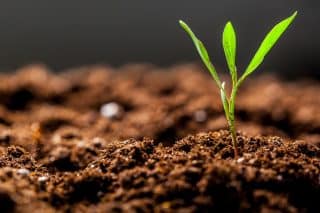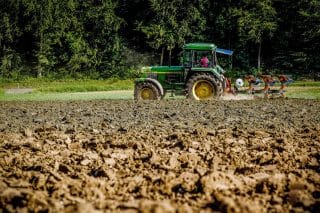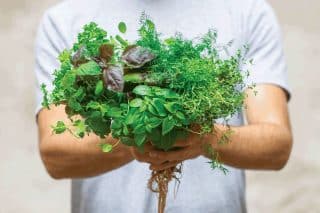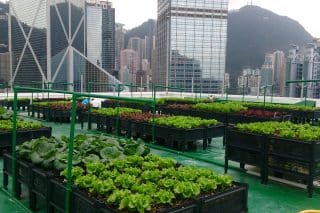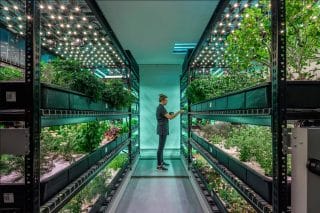Stories: Patachou Inc. Restaurants Support Indiana Family Farms
We’ve already discussed how people want to eat fresh, local food; that they want to know where the produce is harvested and to learn about the new fruits and vegetables on the market. As people look to reunite with their natural environment, farmers become the soul of harvesting a healthier, more satisfying tomorrow. However, it involves many factors and many individuals to take the “locally produced” and “farm-to-table” concepts to a whole new level.
In 1989, savvy businesswoman Martha Hoover—a James Beard Award semifinalist—put innovative thought to action when she launched her first restaurant Café Patachou located in Indianapolis. Locally sourced, to Hoover, means working with farmers hand in hand to plan menus.
When nearly two-thirds of Indiana’s 23 million acres are farmlands, according to InContext, the collaboration between farmers and restaurateurs shouldn’t be any other way. In this case, locally produced and of-the-season ingredients would contribute to incredibly healthy and tasty dishes in every restaurant. Hoover seized the opportunity that others had yet to realize and founded Patachou Inc., opening seven restaurants to date.
Hoover believes that the discussion needs to move beyond eating seasonally, which should be a no-brainer as “that is when ingredients are at their peak and prime taste,” and touch on smart business choices from transparency of food sourcing to pricing and employee benefits, the collaboration with farmers and the company’s contribution to the community, society and the environment.
Read more here.
The company’s first visit to a farm was CUE at Butler & Samuel Fisher (Twin Cook CSA). Every story, every farmer, matters. AgriExpo e-Magazine speaks with the company’s Executive Chef Tyler Herald, who works hand in hand with local farmers and producers every day.

Martha Hoover—a James Beard Award semifinalist. Courtesy of Café Patachou.
AgriExpo e-Magazine: Can you describe the process of visiting one of your farmers?
Executive Chef Tyler Herald: I am always in communication with them. I basically plan the menus around what they have. So I always want to know when and what they are going to have. I also always make sure to use the most of something when it is at it’s seasonal peak. Trying to really highlight and drive the ingredients when they not only taste best but when farmers are flush with them.
AgriExpo e-Magazine: Can you describe further your idea of “working hand in hand”?
Executive Chef Tyler Herald: To me, that is really taking the time to talk through the menus with them and talk to them about maybe growing a certain thing when they might not otherwise. For example, I had always wanted to do a summer menu with fennel. I love the idea of fennel & tomatoes together. But, fennel is much easier to grow in the fall or even spring because of the cooler temperatures. So, I talked to a couple of the farmers that I deal with, and they were up for trying to grow it in the summer…so we did it. And it’s on the menu now!
AgriExpo e-Magazine: How would you compare the difference in pricing between direct-from-the-farm goods to wholesale?
And quality is ALWAYS better direct from the farm.
Executive Chef Tyler Herald: Honestly it all depends. Some things you get from farmers are less expensive, and some are more. But, it’s also about yield. For example, salad greens from a farmer are much fluffier than the stuff you get from a produce company that has sat in a bag for a week. Arugula too. So you may pay a little more, but it fills the plate better, so you use less of it. And quality is ALWAYS better direct from the farm.
AgriExpo e-Magazine: How do you feel farmers and diners benefit from this process you implement?
Executive Chef Tyler Herald: Farmers get their name out there, [contributing to] a successful business. Diners benefit because they know where the food comes from and can trust the source. There may be an occasional bug in some salad mix, but you also know you aren’t ingesting a bunch of stuff you don’t want to. And you are also reducing the carbon footprint by getting something that was raised/grown closer to you. And…it tastes better!!! And looks better!

“It tastes better!!! And looks better!” Courtesy of Café Patachou.
AgriExpo e-Magazine: Do you use any online platforms, those that unite farmers to restaurateurs (such as FarmersWeb, launched only in 2012—nearly 20 years after you began this venture)? How do you feel about these? Would you recommend farmers using such platforms?
Executive Chef Tyler Herald: We use Local Link. I think they are the way of the future. But I think it all boils down to communication and being able to communicate with your source. Upwards of 3500 texts a month. I am constantly texting the farmers I work with…asking about what they have, how much they have, what problems may occur, how I may offset one thing with another. Its constant…but so worth it.
Check out this article on Huffington Post about FarmersWeb: The site currently works with varied partners including meal delivery services like Munchery, corporate cafeterias including Facebook’s, retail stores like Eataly, culinary schools including Natural Gourmet Institute, and restaurants like Amali, Cafe Luxembourg and The Meat Hook.
AgriExpo e-Magazine: How can farmers attract clients/the community to their farms for on-farm sales?
Executive Chef Tyler Herald: I think Farmer’s Markets are the best possible way to get your name out there. There are lots of Farmer’s Markets these days, and it seems like more of the public is frequenting them. This is the best possible way, farmers have their stuff on hand, and can interact with the customer right there. Tell them anything they need to know about the product or farm. And the customer can see everything right there in front of them.

The Café Patachou also started a foundation to help others. Courtesy of Café Patachou.
AgriExpo e-Magazine: Some might wonder how it is possible to implement this strategy of working hand-in-hand with farmers to serve locally produced and farm-to-table meals and also provide over 60,000 healthy, nutritious meals to children in the Indianapolis community who live with pervasive food insecurity. How do you make this possible? What can other restaurateurs learn from your example in order to consider doing the same?
It’s not just a tomato…it takes time to plan to grow it.
Executive Chef Tyler Herald: The biggest thing is you have to WANT to do it. Working with local farmers is something I feel very strongly about and I make sure that all of my sous chefs and kitchen managers do as well. I want them to know that it’s not just a tomato…it takes time to plan to grow it, then get the land ready, then start the seed, then make sure the seed grows, then care for the plant, then pick and harvest the fruit, then wash the fruit, contact me about the fruit, prepare the fruit for delivery, then deliver it and finally I have it in my hand. It’s an amazing process, and I want every person to know and respect that process. And make certain that they take good care of any produce that we may get in. And know that the person who has grown it has worked very hard to get it to that point. And I have worked hard with them to get it.
I also touched on communication earlier. That is so critical. You have to want to do that. It’s easy to pick up a phone, six days a week and have something delivered to you the next day. It’s another thing to plan how you are gonna get one or two deliveries a week from someone and try and figure out how you can make use of 400 lbs of tomatoes in a week, without them going bad. But, that’s what we do.
To me, it’s also about the relationships with the farmers. Knowing their story, their family. Watching their kids grow up, etc. It’s having those relationships that make it even more meaningful, and knowing that you are doing something for the community.
I would tell other restaurateurs, it’s not easy, but well worth it.

